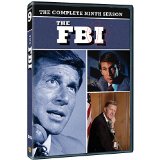| Reviews & Columns |
|
Reviews DVD TV on DVD Blu-ray 4K UHD International DVDs In Theaters Reviews by Studio Video Games Features Collector Series DVDs Easter Egg Database Interviews DVD Talk Radio Feature Articles Columns Anime Talk DVD Savant Horror DVDs The M.O.D. Squad Art House HD Talk Silent DVD
|
DVD Talk Forum |
|
|
| Resources |
|
DVD Price Search Customer Service #'s RCE Info Links |
|
Columns
|
|
|
FBI: The Complete Ninth Season (Warner Archive Collection), The
The Bureau finally meets its match: ennui. Warner Bros.' Archive Collection line of hard-to-find library and cult titles has released The FBI: The Complete Ninth Season, a 6-disc, 23-episode collection of the ABC crime anthology's final 1973-1974 season. The addition of Shelly Novack as Agent Chris Daniels (not to mention the downright odd disappearance--and reappearance--of William Reynolds) does nothing for Efrem Zimbalist, Jr.'s glum countenance, nor for the show's Nielsens, which took a further nosedive this season, finally convincing ABC to pull the plug on the long-running Quinn Martin actioner. With storylines as tired as bored-out-of-skull Zimbalist's face, and the producers' refusal to update the series' format, it's no wonder that by this point even The FBI's core audience was flipping the dials (...I'll admit it: I was over on NBC's The Wonderful World of Disney most Sundays...). No extras for these good-looking color transfers.
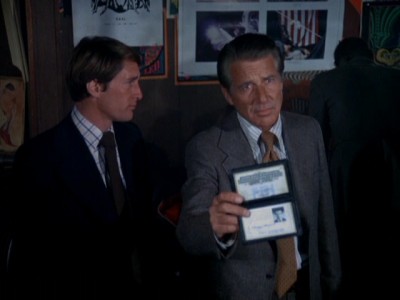
Washington, D.C., 1973. FBI Inspector Lewis Erskine (Efrem Zimbalist, Jr.) is on the line with Arthur Ward (Philip Abbott), Assistant Director of the Federal Bureau of Investigation. Whatever personal life Erskine may have (and by this ninth season we're sure he doesn't have one...), he can forget it because he's been given another assignment. Investigating federal crimes ranging from interstate fugitives to foreign spies to industrial saboteurs to murderous bank robbers, Erskine is now paired with Agent Chris Daniels (Shelly Novack), a young agent who is also selflessly devoted to the Bureau. Devoid of outside interests, Erskine and Daniels grimly go about their work--unsmiling and largely unmoved by any extenuating circumstances for either criminal or victim--protecting the United States from its enemies.
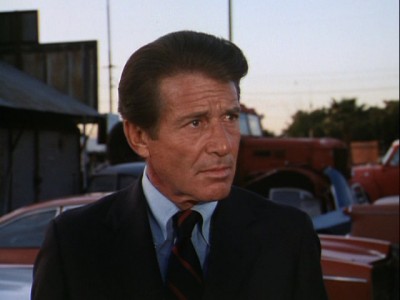
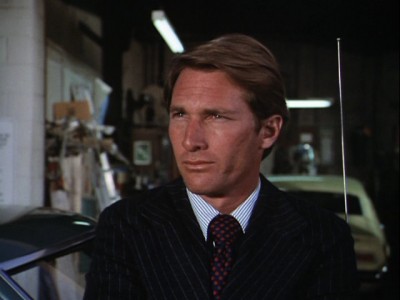
If I sounded enervated in season 8's review, then I'm close to fugue state for this last go-around. If you've been following my reviews for The FBI, what's wrong with you? then you know I greeted all but the last one or two seasons with unreserved pleasure: little noir action mellers that played like pared-down graphic comics, with absolutely no fat and an almost scientific precision to the storytelling that yielded reliably entertaining results, time and again. Fine. Great. But...enough already. It's all just too familiar, now. Just too predictable. And the biggest problem is the one the series sowed right from the beginning: the refusal to make FBI Inspector Lewis Erskine anything more than a cardboard cutout. Now, at the beginning of the show's run, this didn't matter (actually, they did try a little bit of personal shading, including giving Erskine a daughter...but they dropped it fast), because the anthology storytelling was strong, and the production as smooth as any comparable big-screen effort. However, after nine years, I'd like to see Lewis do something other than simply jump out of a Ford and yell, "F.B.I.!" I'm not asking for something monumental like him screwing up his expense account, or clipping some kid with that massive Ford Galaxie 500 he wheels around. How about just seeing him go out on a single lousy date? Can't we see him try and cook an egg in his apartment? How about a trip to the laun-dro-mat? Jesus anything that would reveal one millimeter of dimension to Erskine's life outside that Bureau-issued Ford, would seem like the opening of the Seventh Seal at this point in the show.
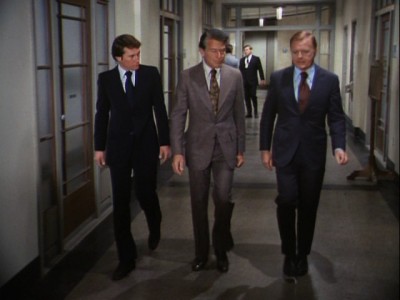
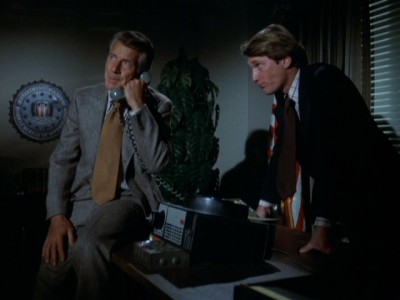
But nope: Zimbalist, Jr., if possible, is even more scarce and distant than usual in this last season (did they "MacMurray" his scenes, with him splitting after a few weeks of intensive shooting...because he's barely around), while former co-star William Reynolds disappears without a trace, only to pop back up, bizarrely, in one mid-season cameo without any context as to what he's doing there...before a previously-shot episode comes along later still and explains his original disappearance. I know it's popular for TV historians to claim that audiences "back then" either didn't notice or didn't care about such grievous continuity errors (a concept based on their conceit towards those more "simple" times...and viewers), but I can assure you viewers were attuned to such lapses, even back in TV's Stone Age, and no doubt loyal FBI fans had to have wondered what the hell was going on with Reynolds--a popular addition to the show--popping in and out of this season, out of chronological order, and without proper explanation. As for Reynolds' replacement, Shelly Novack...he's given about as much respect here by the producers and writers as was Reynolds: little to none. Novack, a former football player-turned-actor (who died unexpectedly of a heart attack just a few years after this gig) seems like a natural, but he's not given anything to do, so his impact is negligible (Zimbalist, Jr. acts like he's not even aware Reynolds has been replaced). Contrast all this jumbling with quite a few blah crime outings--after years of the same old same old--and you've got a recipe for cancellation. Let's look at the episodes.
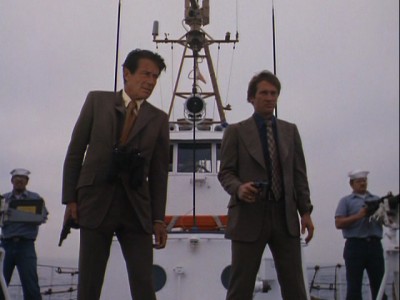
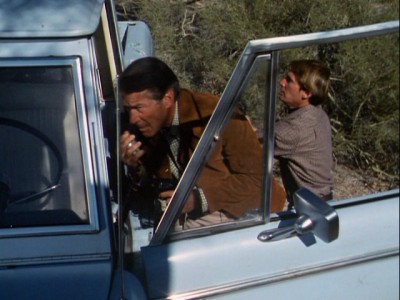
The season opener, The Big Job, from Robert Malcolm Young, sure looks like a lot of other heist episodes the series has featured, although the pace is swift in the sure hands of series regular, Don Medford (his brief armoured car robbery is nicely choreographed). Proof positive that Hoover was by this time dead comes when Novack makes his debut...in a checked suit. The "Novack situation" gets even worse in The Confession, from Jack Turley, when Agent Daniels is seen wearing a gold chain around his neck. A routine kidnapping story here, highlighted with the twist that the perp Hal Linden plays big Vegas performer Nancy Wilson's manager, taking Wilson's daughter Lynne Moody until "her mamma"--as sweaty Linden hilariously keeps calling her--humiliates herself on stage (the reason? Wilson blew off getting a doctor for Linden's kid, who subsequently croaked. The humiliation? Wilson has to publically admit she hit-skipped some poor slob to death). Look for ridiculously handsome Tom Selleck, sans moustache, in a bit part. And is that grim agent of justice Erskine understandingly smiling at manslaughterer Wilson at the end of this episode? What show is this? Finally, the season gets on track with the entertaining Break-In, from Norman Lessing: safe cracker Jackie Cooper is busted out of jail by kin Don Stroud, with an elaborate plan to tunnel through an office basement wall to a bank vault next door. Good actors (Cooper plays it tough, while one of my '70s favs Don Stroud does what he always does best: act cool), excellent, extended detail on the tunneling, and a notable number of super-hot hippie chicks in the background (some line producer here was into hip-huggers and halter tops, bless him), make this one of the more memorable outings this season. Keeping the ball rolling is Calvin Clements' The Pay-Off (with regular collaborator Virgil Vogel--both of whom don't show up enough this season), where working stiff Earl Holliman witnesses a mob rub-out, and decides to take a pay-off...with bad results for his reunion with his estranged family. As usual, the always excellent Paul Richards walks off with the episode with his portrayal of smooth mob fixer who's suddenly pushed into "wet work," while for once, Joseph Wiseman takes it down a notch to "9," to good effect.
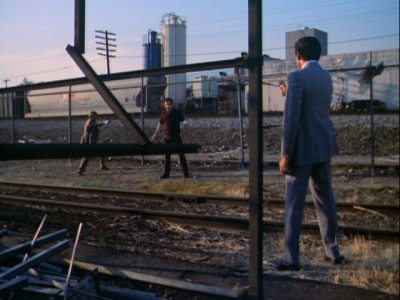
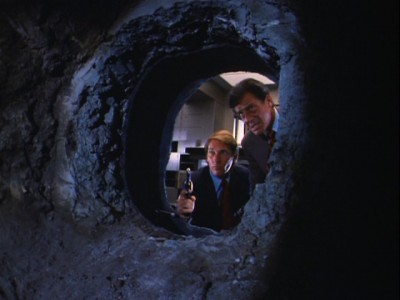
Robert C. Dennis' The Exchange is a so-so heist episode, with Scott Marlowe (a good actor with not much to work with here) and Jesse Vint kidnapping Ron Randell's wife, Antoinette Bower, to get inside dope on their target: a race track. The actors are better than the material here, particularly Bower (wasted in a nothing role) and Barbara Colby (the Phyllis star tragically gunned down in 1975 at the peak of her TV career) as a nasty bit of work in league with the gang. The dire Tower of Terror, from Jackson Gillis, is hilariously misnamed: only boredom is generated when runty schmeil Mario Roccuzzo plants a bomb under a skyscraper (pop-eyed Roccuzzo just doesn't have any "pull" to anchor so central a role). Series regular Mark Rodgers delivers up the tight Fatal Reunion, where thief Ed Nelson forgets his Thomas Wolfe and tries for one last shot at redemption (as well as love with a dispirited Susan Oliver) at his high school reunion...only to meet utter humiliation at the fade-out (familiar face Nelson always delivered the goods). Rules of the Game from Ed Waters is a distressingly routine mob outing, where The Godfather's John Marley has to give up his dopey son Paul Cavonis for pulling an unauthorized hit. I expected more with that cast (especially when I saw Anthony Zerbe's name), but it's routine, right down the line. Speaking of routine, Robert Lenski's noir suspenser, Fool's Gold, offers no surprises when ex-con Leslie Nielsen is pushed by his hot girlfriend Susanne Benton into helping old buddy Lou Antonio move a stolen religious relic: The Cross of St. Croix (which, unless my high school French fails me, translates into the nonsensical "The Cross of St. Cross"?). Lou Antonio is another good actor who comes a cropper in this season of FBI offerings...although it's hard to concentrate on his or anyone else's thesping with sexy, cold-eyed Benton running around in those hip-huggers and tied-off shirt. The mediocrity continues with Irv Pearlberg's The Killing Truth, where Jack Bender tries to avenge his traitor father's death by killing Judge Lloyd Nolan. Tim O'Connor, another fav of mine from this time period, fumbles around in a nothing part not worthy of his talents...which seems to be a recurring theme this season.
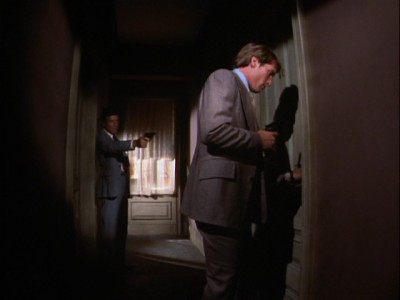
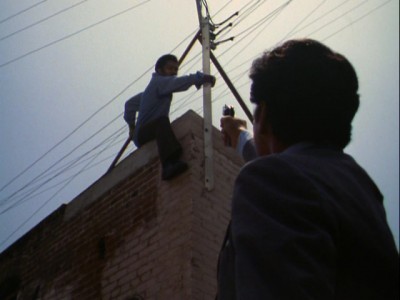
More generic mob shenanigans with Barry Oringer's The Bought Jury, where Joel Fabiani (smooth) orchestrates a hung jury for "Organization" boss Frank DeKova...so he can waste him (the "action" finale finds Zimbalist, Jr. in an earth mover for literally all of five seconds--pathetic). A solid cast--Zalman King, Jerry Houser, Anne Francis, Fred Beir, Michael Conrad, and Jo Ann Harris (I feel faint...)--enlivens Ed Waters' Ransom, a pretty standard kidnapping outing. In Mark Rodgers' A Piece of the Action, trucking magnate Charles Cioffi is vexed by his irresponsible brother George DiCenzo, who's using "The Organization" to bump off competitors. When a scripter has a character utter, "Brother against brother? Sweetheart, that's the oldest story in the world," he better make sure his script isn't as cliched as that set-up (an excellent cast here, including Joan Hotchkis, Hal Burton, Val Avery, and fav Kelly Thordsen, are, what else this season, wasted in this too, too familiar storyline). S.S. Schweitzer's Selkirk's War plays like a cheap "movie of the week, " when disgraced Army officer Peter Haskell (overacting) "recruits" Richard Jaeckel (phoning it in) and Roger Robinson (clearly contemptuous of the material) to highjack an armored Army payroll car (the showdown in the desert is laughably thin). Schweitzer returns with the equally unimpressive The Betrayal, which finds a glum Michael Tolan escaping from prison when he finds out "The Organization" didn't take care of his family (Count Yorga's Robert Quarry is here in one of his many ignominious bit parts, while little Moosie Drier correctly I.D.s the umpteenth Ford product placement this season: "A Mercury!" he croaks). Curiously, there's no screenwriter credit for the excellent, The Animal, directed by pro Walter Grauman, which finds Gary Lockwood in good, violent form as a hitman on the run. He makes quirky, funny chemistry with Meg Foster, inbetween believably slapping people around (this is the episode that finally, finally explains what happened to William Reynolds: he has his own office on the coast, in an apparent promotion).
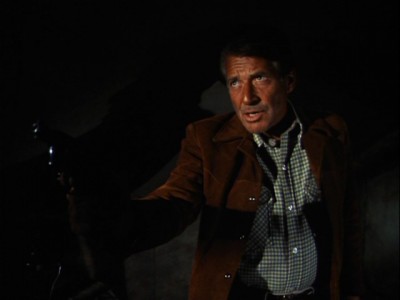
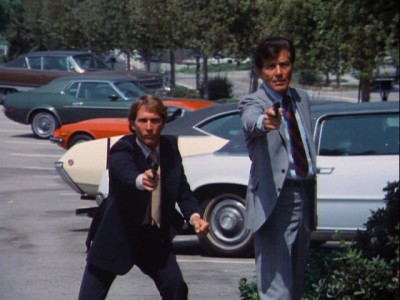
Calvin Clements' The Two Million Dollar Hit sports a good cast--Henry Silva, Sharon Farrell, Jack Ging, Khigh Dhiegh--in a travelers checks heist that frankly...I didn't understand (how could anyone use these, even fenced, when the serial numbers of the stolen checks are automatically circulated, and the checks immediately cancelled?). Good actor Laurence Luckinbill drags around beautiful blind hippie chick Elizabeth Ashley in Arthur Weingarten's energetic Diamond Run, where amateur diamond thief Luckinbill runs from steely assassin Victor Newman Eric Braeden. Leo Gordon has a small, funny bit as a drunk bystander. Now, certainly the best offering this season is Robert Lenski's Deadly Ambition, which is the kind of episode The FBI needed to be making years before this final season. Harvey Keitel is a small-time punk who boosts an armored car, and decides he's big enough now to move on up (he winks at his Humphrey Bogart poster while preening in front of a mirror). There's a decidedly nasty edge to this outing, and more importantly, an air of unpredictability resting wholly on Keitel's creepy performance, which plays like it's from another planet compared to The FBI's more conventional house style thesping (exploitation queen Claudia Jennings--Gator Bait!!--looks seriously frightened of Keitel during their uncomfortable scenes together; when he "affectionately" gets her in a choke hold and puts his finger in her mouth, I thought, "Now this is where The FBI needed to go!"). We even get Erskine looking dejectedly out the window in the fade-out, when he realizes that scum like Keitel won't ever learn--that's about the closest we're ever going to get on fleshing out his two-dimensional character (even that little moment comes over as a shock, after nine years of Erskine's impassive efficiency). The good episodes continue with The Lost Man, a muscular actioner from Judy Burns that finds an agreeably pissed-off Robert Foxworth escaping from prison to settle a score with journalist Don Porter, who set him up for a phony blackmailing scheme. Good action sequences in the snowy California mountains (I'm shocked they got Porter to stumble around in all that deep snow), and look for a bit with Annette O'Toole (luminous, as usual).
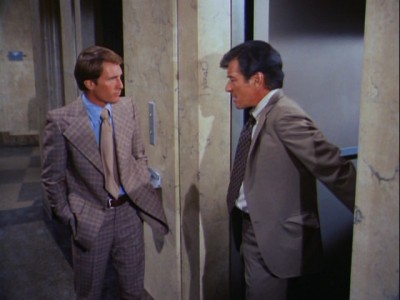
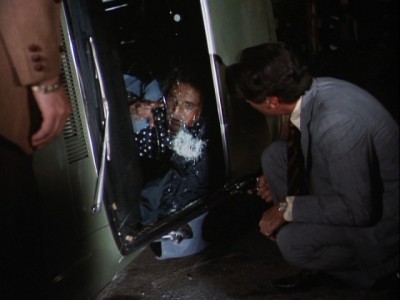
Excellent performances from John Vernon and James Gregory highlight the okay The Vendetta, from Richard Landau, as mob boss Vernon returns to America to avenge his brother's death (there's a great noirish scene between the talented Vernon and sexy Joan Van Ark--who was always better playing a shady character rather than the "good girl" Val from Knots Landing--where she tries to snow him again about his brother's death; as she desperately tries to kiss him, he stares off into space with those icy blues before intoning in that beautifully mellifluous voice, "So let this be my last goodbye," as he raises his fist...only to kiss her). We keep rolling along with better-than-expected episodes with the pulpy Confessions of a Madman, written by Richard Landau and directed by co-star Phillip Abbott: pretty young sorority girls are getting killed on campus, and a madman is leaving taped messages taunting his future victims. F.B.I. cadet Mary Frann goes undercover to help...but after nine years, pro Lewis Erskine is still fumbling around with potential evidence with his bare hands (Erskine makes up for this fingerprints no-no by his no-nonsense, unsentimental "goodbye" to Fran for all her dangerous work: "By the way, Pat...that was a nice move you made with the knife." He's a charmer...). Finally, The FBI closes its files with Survival, from Irv Pearlberg. Erskine and Daniels are in the desert, tracking escaped con Jon Cypher (excellent here), when Daniels is critically injured in a fall. Now Erskine needs Cypher to save Daniels, while Cypher has other ideas. Although sexy Julie Gregg's sudden appearance is wildly improbable, she gives a nicely off-kilter performance; we don't know where her sympathies lie. A fine psychological cat and mouse game, married to a solid actioner--it's an appropriate, even fitting end to the series.
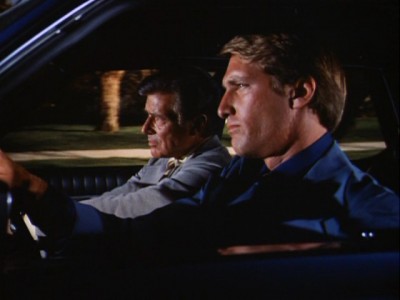
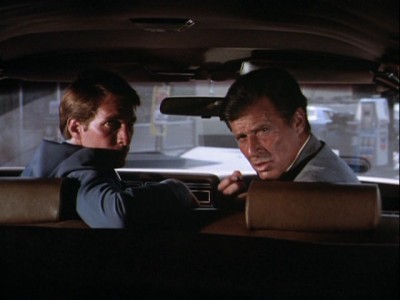
In a last-ditch effort to save The FBI's fast-falling ratings (the year before, it managed to eke out a 29th slot in the Nielsens), ABC moved the show back a half-hour, to 7:30pm on Sundays--a switch that helped sealed its fate. For the previous 1972-1973 season, viewers of the popular NBC 7:30pm show, The Wonderful World of Disney, had a chance to switch over at 8:00pm to watch ABC's The FBI, if whatever Uncle Walt's ghost was presenting, wasn't to their liking (or when the kids were shooed off to their 8:00pm bedtimes...and yes, parents back then had early bedtimes for kids). However, now going head-to-head with the Mouse (since there was no competition from CBS's reboot, The New Perry Mason), parents had to choose between cartoons and adventure movies, or the same tired cops-and-robbers of the Bureau, with the small fry winning out: The Wonderful World of Disney finished a strong 12th for the year-end ratings, while The FBI dropped well out of the Nielsen Top Thirty, and was cancelled.
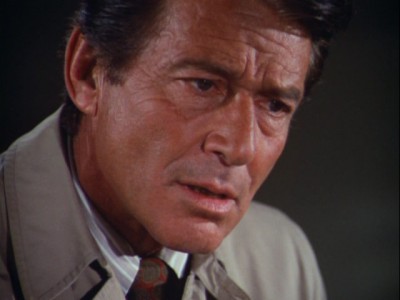
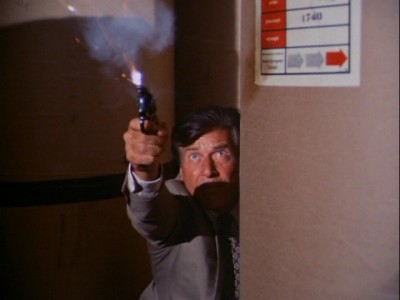
The Video:
As has been the case for most seasons in this series, the fullframe, 1.37:1 color transfers for The FBI: The Complete Ninth Season look very good, with solid color, a sharp image, good contrast, and a low amount of imperfections, like scratches and dirt.
The Audio:
The Dolby Digital English mono audio tracks are fine, with low hiss and a solid re-recording level. No closed-captions or subtitles.
The Extras:
No extras for The FBI: The Complete Ninth Season.
Final Thoughts:
Convicted on nine counts of languor and weariness. Just sheer repetition killed The FBI--that, and a refusal to flesh out its lead anchor, Lewis Erskine, when all the appeal of efficient, anonymous, comic book-style storytelling had finally worn off with viewers. There are a few isolated gems in this ninth and final go-around, but they're few and far between. You only have to look at Zimbalist's tired, lined, disinterested face to understand exactly why this show needed to be cancelled. For fans of the series, though, I'm still recommending The FBI: The Complete Ninth Season...but only for them.
Paul Mavis is an internationally published movie and television historian, a member of the Online Film Critics Society, and the author of The Espionage Filmography.


|
| Popular Reviews |
| Sponsored Links |
|
|
| Sponsored Links |
|
|
| Release List | Reviews | Shop | Newsletter | Forum | DVD Giveaways | Blu-Ray | Advertise |
|
Copyright 2024 DVDTalk.com All Rights Reserved. Legal Info, Privacy Policy, Terms of Use,
Manage Preferences,
Your Privacy Choices | |||||||









